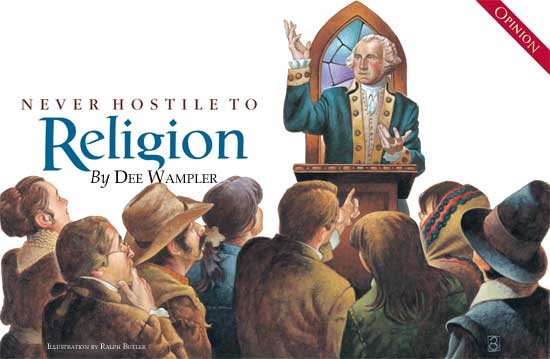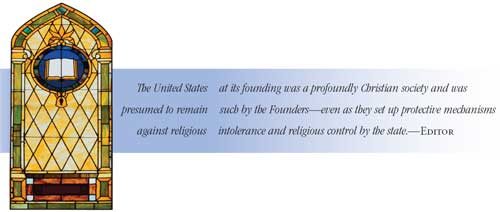Never Hostile to Religion
Dee Wampler July/August 2005
Getting your Trinity Audio player ready...

The U.S. Supreme Court ruled that the Constitution "affirmatively mandates accommodation, not merely tolerance of all religions, and forbids hostility towards any." Anything less than accommodation would require "callous indifference," which was never intended by the establishment clause of the First Amendment.
Looking at the initial drafts of the First Amendment makes it clear that our Founders sought to forbid a national religion, but never once, in the slightest, believed that our government would ever be hostile toward religion.
One of the most important political documents and political speeches ever delivered in our nation was Washington's Farewell Address. He pointed out that two foundations for political prosperity are religion and morality, and no one could be called an American patriot who attempted to separate politics from its two foundations: "Of all the dispositions and habits which lead to political prosperity, religion and morality are indispensable supports. In vain would that man claim the tribute of patriotism, who should labor to subvert these great pillars."
After serving as leader of our forces in the Revolutionary War and for two terms as the first president of the United States, George Washington gave his farewell address, reminding us that "we can never hope to be a happy nation" if our society endures without religion.
Alexis de Tocqueville (1805-1859), the famous French statesman and historian who penned a two-part work between 1835 and 1840, Democracy in America, gave us a comprehensive and penetrating analysis of the relationship between character and society in America. It was the religious aspect of our country that first struck his attention: "Religion in America . . . must be regarded as the foremost of the political institutions of that country."
Also consider the statement of President Woodrow Wilson that "America was born a Christian nation," and of Patrick Henry that "it cannot be emphasized too strongly or too often that this great nation was founded not by religionists but by Christians."
As to religious expression in public schools, Benjamin Rush, a signer of the Declaration of Independence, allowed that the "only foundation for useful education in a republic is to be laid in religion." The Northwest Ordinance of 1787 set aside federal money for schools and ordered: "Religion, morality, and knowledge, being necessary to good government and the happiness of mankind, schools and the means of education shall forever be encouraged."
The New England Primer opened with religious admonitions, followed by the Lord's Prayer, the Apostles' Creed, the Ten Commandments, and the names of the books of the Bible.
The famous McGuffey's Reader, first published in 1836, which was the mainstay in public education until the 1920s, making it the most widely used and influential textbook of all time, recited: "The Christian religion is the religion of our country. From it are derived our prevalent notions of the character of God, the great moral governor of the universe. On its doctrines are founded the particularities of our free institutions. . . . The Ten Commandments and the teachings of Jesus are not only basic but plenary."

Political science professors at the University of Houston recently collected all the writings from the founding era to see whom the Founders were quoting. Researchers assembled more than 15,000 writings. The project spanned 10 years, and by the end of their work, researchers isolated 3,154 direct quotes made by the Founders, and identified the sources of these quotes. The man most quoted was Baron de Montesquieu (8.3 percent). Sir William Blackstone was second (7.9 percent,) and John Locke was third (2.9 percent). Surprisingly, researchers discovered that the Founders quoted directly out of the Bible four times more often than they quoted Montesquieu, four times more than Blackstone, and 12 times more than John Locke. In all, 34 percent of all the Founders' quotes came directly out of the Bible.
The study is even more impressive when the sources of the ideas used were identified. Sir William Blackstone (1723-1780), the English jurist whose Commentaries on the Law of England is the most famous treatise on the law ever written, stated the God-centered view of law that may be out of fashion with some lawyers in today's legal community. Blackstone's work was used for more than one century to settle disputes, define words, and examine procedures. He used the Bible again and again to arrive at his conclusions.
Biblical heritage was so well understood during the early years of our nation that the U.S. Supreme Court declared in Church of the Holy Trinity v. U.S.: "No purpose of action against religion can be imputed to any legislation, state or national, because this is a religious people. . . . This is a Christian nation."
In People v. Ruggles, the U.S. Supreme Court stated: "Whoever strikes at the root of Christianity tends manifestly to the dissolution of civil government."
Illustrations of the close connection between faith and public life include the following:
- When the federal legislature met in 1789, one of its very first actions was to appoint chaplains in both Houses of Congress.
- On the very day Congress approved the wording of the First Amendment, its members resolved to request of President Washington a day of public thanksgiving and prayer.
- Every president of the United States (with only one possible exception) has been administered the oath of office with his hand on the Bible, ending with the words "So help me God."
- The Supreme Court begins every proceeding with the ringing proclamation "God save the United States and this honorable Court."
- All currency bears our national motto, "In God we trust."
- The Pledge of Allegiance to the Flag affirms that we are "one nation under God." Congress would not allow a comma to be placed after the word nation, in order to reflect the basic idea that ours is a "nation founded on a belief in God."
- The Declaration of Independence reads, "All men . . . are endowed by their Creator with certain unalienable rights, that among these are life, liberty, and the pursuit of happiness."
- President George Washington proclaimed a Thanksgiving, with religious overtones; a day of national celebration. Congress made it a national holiday more than a century ago.
- The National Gallery of Art in Washington, D.C., exhibits arts with religious messages, including The Sacrament of the Last Supper, The Birth of Christ, The Crucifixion, and The Resurrection, among many others with explicit Christian themes and messages.
- Legislative prayers have been upheld by the U.S. Supreme Court.
- Tax exemptions for church properties were upheld by the U.S. Supreme Court.
- Congress approves of federal grants for college buildings of church-sponsored institutions.
- Engraved on the metal cap of the Washington Monument are the Latin words Laus Deo, which mean "Praise be to God."
- Along the stairway of the Washington Monument are carved on tribute blocks the following:
-
- In God We Trust
- God in Our Native Land
- Search the Scriptures. (John 5:39; Acts 17:11)
- Train up a child in the way he should go and when he is old, he will not depart from it. (Proverbs 22:6)
- Suffer the little children to come unto Me and forbid them not; for such is the kingdom of God. (Luke 18:16)
- May Heaven to this Union continue its beneficence.
We have, in the past 200 years, adopted a Judeo-Christian concept of welcoming all peoples and all religions. We have learned not to speak at one another, but with one another. We have made our nation a neighborhood, but unfortunately not yet a brotherhood. This article should remind us of our heritage.
In the context of current events today, the issues of church and state rage and gather much national attention. There are few issues so likely to generate heat rather than light, as the question of the proper line between the realm of church and state. May we ever keep in mind the heritage of our faith, and the Source of all national security.
*This article points out what Liberty is often at pains to acknowledge: the United States at its founding was a profoundly Christian society and was presumed to remain such by the Founders - even as they set up protective mechanisms against religious intolerance and religious control by the state. The historical examples cited in the article are less a proof of intention than of the entangling nature of the shared religious assumptions. Editor.
___________________________
Dee Wampler is a former prosecuting attorney and currently a defense trial attorney in Springfield, Missouri.
___________________________
1 James D. Richardson, A Compilation of the Messages and Prayers of the Presidents, 1789-1887, 1899), Vol. I, p. 220.
2 Roger Lundin and Mark Noll, Voices From the Heart: Four Centuries of America (Grand Rapids: Eerdman's, 1987), p. 237.
3 Time, Feb.14, 1954, p. 49.
4 David S. Lutz, The Origins of American Constitutionalism (Baton Rouge, La.: Louisiana State University Press, 1988), p. 142.
5 Jason S. Marks, "Only a Speed Bump Separating Church and State?" Journal of the Missouri Bar, February 2001.
6 Richard Elsworth-Day, Man of Like Passions (Grand Rapids: Zondervan Publishing House, 1942), pp. 34-37.
7 143 U.S. 457 (1892).
8 Johns. R. 290 N.Y. (1811).
9 31 USC